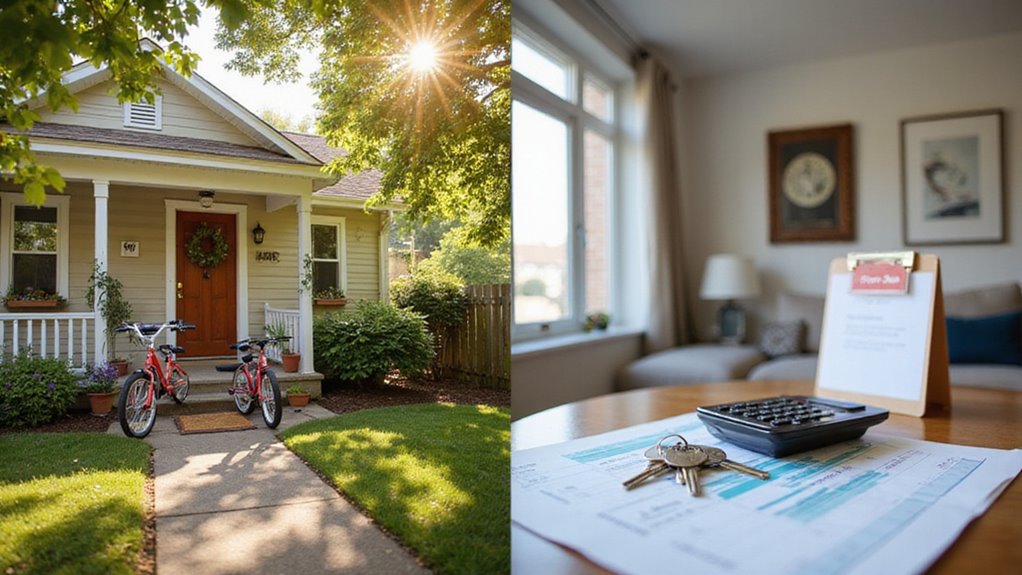Deciding whether to sell a rental property or a primary residence is a big financial decision. Each option comes with different rules, tax effects, and challenges. Many homeowners and investors feel unsure about which path brings the best outcome.
These differences can quickly become overwhelming. Tax rules about depreciation and capital gains are complex. Tenant rights and emotional attachment can make the sale even more stressful.
Selling a rental property differs from selling your primary home in taxes, timing, and emotional impact. Knowing these contrasts helps you make smart choices. You can then avoid costly mistakes and maximize your profits. This blog will break down the key differences and guide you through the sales process with clarity.
Key Takeaways
- Selling a rental property triggers depreciation recapture and full capital gains tax, while primary residences may qualify for large tax exclusions on profits.
- Rental property sales often involve tenant management, notice requirements, and adherence to local landlord-tenant laws, unlike primary residences.
- Marketing rental properties focuses on income potential and lease terms for investors, whereas primary home sales highlight lifestyle and neighborhood features to buyers.
- 1031 exchanges can defer taxes when selling rentals if reinvested in similar properties; primary residences are not eligible for this tax benefit.
- Documentation and disclosure requirements differ, with rentals demanding detailed financial records and tenant information, while homes require condition and defect disclosures.
Tax Implications and Capital Gains

When you sell a home, taxes on your profit depend on how you used the property. If the home was your main residence, you may not have to pay tax on all the profit. The IRS lets individuals exclude up to $250,000, and married couples exclude up to $500,000, if they lived there for two out of the last five years. If you are preparing for a sale, it’s helpful to declutter and depersonalize your space, as this can make the home more appealing to buyers.
Selling a rental property works differently. You cannot use the same exclusion for capital gains as you can with a main home. The entire profit is usually taxed.
Rental income history and tenant records do not affect the capital gains tax amount. These records only prove the property was used as a rental, not as your home. Always keep clear records for tax purposes.
It’s also important to be aware that if the property has outstanding liens, these must be cleared before you can complete the sale.
Depreciation Recapture Rules
Depreciation recapture rules require you to pay tax on past depreciation when you sell a rental property. The IRS taxes the part of your profit that comes from depreciation. This rule is different from the one used for selling your main home. You must report all depreciation you claimed or could have claimed on your rental property. If you do not, you risk an audit and extra taxes. The depreciation recapture tax has a maximum federal rate of 25%.
Depreciation recapture is separate from the capital gains tax. It applies whether or not your rental made money each year. When selling a rental, errors in paperwork can also lead to delayed closings or penalties, so it’s important to ensure documents are accurate. If you sell your rental, you will need to account for this tax. For property owners who want to avoid complex tax issues and sell as-is, cash home buyers in La Grange offer a fast solution that eliminates the need for repairs or lengthy listings.
Impact of 1031 Exchanges

If you’re selling a rental property, a 1031 exchange lets you defer capital gains taxes by reinvesting in another qualifying investment property. You’ll need to ensure both properties meet the IRS’s strict requirements and adhere to rigid timelines for identifying and closing on the replacement asset. These rules don’t apply when selling a primary residence, so your tax planning options differ significantly.
If your property has an assumable mortgage, it’s important to verify eligibility and understand the specific lender requirements before proceeding with a 1031 exchange. For homeowners facing financial distress, cash home buyers can offer a fast and guaranteed transaction, which is especially beneficial if you need to sell quickly to avoid additional financial complications.
Deferring Capital Gains
You can delay paying capital gains taxes when selling a rental property with a 1031 exchange. This rule lets you use sale profits to buy another similar property. If you use a 1031 exchange, you keep more money to invest.
You must follow strict rules and deadlines for a 1031 exchange. A mistake may cancel your tax deferral. Always learn about the process before starting.
If you plan to sell, check your current equity and possible profit. You should talk to a qualified intermediary before listing the property. If you stage the property, you may attract higher offers.
Screen your tenants if they will stay during the sale. Stable tenants can help the process go smoothly. Careful planning makes the exchange easier.
Qualified Property Requirements
Properties must be held for investment or business use to qualify for a 1031 exchange. Rental properties meet this rule, but primary residences do not. The property should provide rental income and need active management.
Vacation homes only qualify if managed strictly as rentals. Properties you plan to resell, like flips, do not qualify. Personal-use homes also do not meet the requirements.
You must keep records showing you intend the property for investment. Examples include lease agreements or management contracts. If you are unsure, consult a tax advisor for guidance.
Strict Timing Rules
The IRS sets strict deadlines for 1031 exchanges to allow tax deferral. You must follow these deadlines, or you will lose the tax benefit. Missing a deadline means you could owe capital gains taxes.
You have 45 days from your sale to list possible replacement properties in writing. You must buy a replacement property within 180 days of your sale. Both periods start from the day you sell your rental.
Extensions to these deadlines are very rare and happen only in federally declared disasters. If you delay property identification or closing, you risk losing your tax deferral. Careful planning is needed to meet all timing rules.
Treatment of Mortgage Interest Deductions

When you sell a rental property versus your primary residence, you’ll notice key differences in how mortgage interest deductions apply. These distinctions affect your taxable income and require you to follow separate IRS reporting protocols. Understanding these variations ensures you maximize allowable deductions and remain compliant with tax regulations.
Additionally, the type of mortgage you have—such as fixed-rate mortgages or adjustable-rate mortgages—may impact your eligibility for certain tax benefits when selling. It’s important to note that having a clear title is essential in any real estate transaction, as unresolved ownership or lien issues can delay the sale and impact your ability to claim deductions properly.
Deduction Eligibility Differences
Homeowners and real estate investors face different rules for mortgage interest deductions. The tax code treats a primary home and a rental property differently. Deduction eligibility depends on how you use the property and report income.
You can deduct mortgage interest on your main home only if you itemize deductions. The law now limits how much mortgage interest you can deduct for a primary home. These limits do not apply the same way to rental properties.
Mortgage interest on a rental property is a business expense. You can deduct it from your rental income. This helps lower your taxable income from the property.
Each property type has separate deduction rules and limits. If you want to claim these deductions, you must keep good records. The IRS may ask for proof if you are ever audited.
Impact on Taxable Income
The impact on your taxable income depends on whether the property is your home or a rental. Mortgage interest on your main home can be deducted if you itemize your taxes. This deduction reduces your taxable income up to the IRS annual limit.
If you own a rental property, you deduct mortgage interest as a business expense. This deduction lowers your rental income before taxes are calculated. You can also deduct costs like property depreciation and repairs.
When you sell a rental property, you may have to pay tax on depreciation you claimed earlier. This is called depreciation recapture and can increase your taxable gain. Knowing these rules helps you make better decisions about renting or selling property.
Reporting Requirements Variations
The IRS treats mortgage interest deductions differently for a primary home and a rental property. You must report mortgage interest based on how you use the property. These rules can change your tax planning.
If a home is your main residence, you deduct mortgage interest on Schedule A if you itemize. The amount you can deduct depends on certain loan limits. Always check if you meet these limits before claiming the deduction.
If the property is a rental, you report mortgage interest on Schedule E. This interest is a business expense and reduces your rental income. You do not need to itemize deductions to claim this.
Selling a rental property changes your cost basis for tax purposes. This is different from selling your main home. Record keeping is important for both property types.
The IRS requires different documents for primary and rental properties. You should keep loan statements and proof of payments. Good records help if the IRS asks for details.
Handling Tenant Occupancy During the Sale

Selling a property with tenants living there needs careful planning and legal awareness. Owners must follow the lease and local laws at every step. If these rules are ignored, the sale may face delays or legal trouble. Property managers help keep the process smooth and professional. If tenants take good care of the property, investors may find it appealing. Mold issues can further complicate the process, as health and safety concerns may lower buyer interest or property value. If buyers want to live there, a vacant home is often better.
Owners should look at the lease dates before selling. If the lease is ending soon, it may be easier to sell to new owners. Clear communication with tenants and set procedures can reduce problems during showings and inspections. Additionally, sellers must ensure they give proper notice to the tenants to comply with legal requirements and maintain transparency throughout the process.
Notice Requirements for Current Tenants
Before you sell a rental property, you must follow notice rules for tenants. These rules protect tenant rights and keep you legal. Always check notice requirements before taking any sale steps.
State and local laws often set notice periods between 24 and 60 days. You should confirm the exact time frame for your area. If you skip this step, you might face legal trouble. It’s also important to consider whether there are any ownership timeline requirements that could affect your ability to sell, especially if the property was recently inherited.
Written notice is usually required. Make sure to document all communication with tenants. This record helps if questions come up later.
Explain how the sale may affect the lease and tenant privacy. If tenants understand the process, they may cooperate more. Clear updates also help protect your rental income during the sale.
It’s also important to provide all legal disclosures required in your state when notifying tenants and preparing for the sale.
Staging and Showing Rental Properties

Staging and showing rental properties helps attract more buyers. Good staging makes the home look its best, even with tenants present. If the property looks clean and inviting, buyers will be more interested. For landlords looking to sell property in Simpsonville, a well-staged home can also help avoid lengthy listing times and unnecessary disruptions.
Simple steps like removing clutter and using neutral colors create a welcoming space. Proper lighting can make rooms look bigger and brighter. If tenants still live there, landlords should give notice before showings.
Group showings or virtual tours can make the process easier for everyone. These methods limit disruptions for tenants and save time. If you combine staging and smart showing strategies, you can sell your rental faster. Addressing necessary repairs before showings can instil trust in prospective buyers and improve your chances of a smooth sale.
Disclosures and Legal Obligations
When selling, you must meet strict notification requirements if tenants occupy the property, and you’re obligated to disclose any known defects or issues. Property condition disclosures differ by state, so it’s essential to review local statutes and standard forms. Don’t overlook existing lease agreements, as they directly affect buyer negotiations and your legal responsibilities. If your property is located in Oldham County, KY, you may benefit from a hassle-free property solution that allows you to sell without worrying about repairs, showings, or traditional selling expenses.
Tenant Notification Requirements
Landlord obligations change when you sell a rental property with tenants living there. You must follow specific rules for notifying tenants about the sale. These requirements protect tenants’ rights during the selling process.
Landlords must give written notice to tenants within the legal timeframe. If state law sets a deadline, you must follow it. Written notice helps prevent confusion or disputes.
Lease agreements must be honored unless you have legal grounds to end them early. If the lease continues, the new owner takes over as landlord. Rental income and lease terms usually transfer to the buyer.
You must give tenants advance notice before any showings, usually 24 to 48 hours ahead. If you do not provide proper notice, tenants may refuse entry. Following this rule avoids legal issues and maintains good relations.
If you meet these requirements, the sale process should go smoothly. Not following the law can cause delays or legal problems. Understanding your obligations helps protect everyone involved.
Property Condition Disclosures
Property condition disclosures are required by law. You must tell buyers about any known problems with the property. This applies whether you live there or rent it out.
Disclosures affect how much your property is worth. Appraisers and lenders use this information when deciding on the value. If you hide issues like damage or code violations, you could face legal trouble.
Buyers may want to renegotiate or cancel the sale if they learn of hidden problems. For rental properties, mention any recent repairs or maintenance. This helps buyers understand future costs and the property’s value.
Complete and honest disclosures help prevent disputes. They also make the selling process smoother for everyone. If you follow these rules, you protect yourself and your sale.
Lease Agreement Considerations
Selling a rental property requires careful attention to lease agreements because tenants’ rights transfer with the sale. Lease agreements outline rules that the new owner must follow. If you ignore these, you could face legal problems or delays.
Owners should review all current leases for rules about transferring the agreement. Notices must go to tenants before showings or the sale. Buyers need to know about tenant rights and any lease obligations.
If state or local laws require extra tenant protections, sellers must follow them. Failing to do so could result in legal disputes. Careful management of these steps helps the sale go smoothly.
Pricing Strategies and Market Positioning
Pricing strategies and market positioning are different for rental properties and primary residences. Each aims to get the best return, but the approach depends on the type of property and buyer.
Rental property pricing should focus on income, tenant status, and comparable investment sales. Investors often care about cap rates and cash flow. If you are selling a rental, position it by highlighting its earning potential.
Primary residence pricing relies on emotional appeal and recent neighborhood sales. Buyers look for homes ready to move into and fitting a desired lifestyle. If you sell your own home, market it for comfort and personal use.
All sellers must follow disclosure rules and check for local restrictions. If you ignore these, you risk legal problems. Make sure you meet all laws and fair housing requirements.
Potential Buyer Types and Marketing Approach
Rental properties and primary residences attract different types of buyers. Investor buyers focus on profit and rental income, while owner-occupants look for a place to live. Their goals affect how you should market your property.
Investor buyers care about rental income, lease terms, and tenant occupancy. If you target investors, show clear financial records and highlight cash flow. You should be ready to discuss tenant history and lease agreements.
Owner-occupants focus on neighborhood, schools, and move-in condition. If selling to them, highlight community features and property readiness. You should also make the home look welcoming and easy to settle into.
If you want to reach both groups, tailor your message to their needs. Show investors the income potential and show owner-occupants the lifestyle benefits. Always prepare important documents and be ready for questions about tenants or property use.
Timeline for Vacating and Closing
When you’re selling a rental property, you’ll need to comply with tenant move-out notice periods and any existing lease terms, which can extend your timeline before closing. In contrast, selling your primary residence gives you greater flexibility to coordinate your own move and set the closing date. Understanding these differences will help you plan for market timing, legal obligations, and a smoother transaction.
Tenant Move-Out Requirements
Tenants can usually vacate only when their lease ends or if an early termination clause exists in the agreement. This means your closing timeline may be delayed until tenants move out. Selling a rental property often takes longer than selling a primary home.
Lease expiration and renewal dates will determine when tenants must leave. State and local laws often require you to give tenants 30-60 days’ notice. You must follow these rules to avoid legal issues.
If you want tenants to leave sooner, you can try to negotiate an early move-out. Offering incentives may encourage tenants to cooperate. Always check your lease and local laws before making any agreements.
Owner Occupancy Flexibility
Owner occupancy flexibility means you have more control over move-out and closing dates when selling your home. You can negotiate with the buyer to set a timeline that works for both of you. This helps you plan your next steps and reduces stress.
If you sell a rental property, tenants complicate the process. You must follow lease agreements and give proper notice, which can delay closing. Buyers may also be less interested if tenants are still living there.
When you sell your own home, you are not restricted by tenant rights or lease terms. This allows you to match your sale with your personal or financial plans. The process is more predictable and easier to manage.
Repair, Maintenance, and Condition Considerations
Buyers check a property’s condition closely before making an offer. Fixing repair and maintenance problems is important when selling any home. A well-kept property attracts more interest and better offers.
Rental homes may have more repair issues from tenant use. These homes often need extra attention to bring them up to standard. Owners should look for any deferred maintenance before listing.
Primary homes may need fewer repairs if you already keep up with maintenance. Strategic updates, like fresh paint or new fixtures, can add value. Small upgrades often offer a good return on investment.
Always fix safety and code issues first, such as faulty wiring or leaks. Improving the yard and entrance boosts curb appeal. Keeping records of repairs can help build trust with buyers.
If you make smart improvements, you can increase your sale price. Proactive repairs also lead to fewer problems during negotiations. This approach helps your sale go smoothly.
Emotional Factors and Personal Attachments
Emotional factors are often important when selling property. Personal attachments can make selling your main home more difficult. Memories and feelings may affect your decisions during the process. Selling your home is often an emotional process, as personal attachments and memories can make decisions more challenging.
If you sell your primary residence, you might overprice the house due to emotional value. You could also reject fair offers or avoid making needed repairs. These actions can make the sale harder or slower.
Selling a rental property usually feels less personal. Owners often see it as an investment and focus on profit. If you approach the sale this way, you may find it easier to make clear decisions.
Recognizing these emotional differences can help you manage your expectations. If you stay objective, you can make better choices and follow all legal rules. This is important whether you sell a home you lived in or a rental property.
Cash Flow and Investment Analysis
A cash flow and investment analysis helps you decide if you should sell your rental property or your home. It examines your income, costs, and possible future value. This process gives you a clear picture before making a choice.
Rental properties need careful review of rent income, vacancies, and lease terms. You should include property management fees and repair costs. If these costs rise or rental demand drops, your returns may decrease.
Selling your primary home involves different factors. Cash flow is not a concern, but opportunity cost and future price growth matter. If market trends are weak, holding the property may not be wise.
Tax rules also affect your decision. Capital gains exclusions apply for main homes but not for rentals. If you do not qualify for these, your tax bill may increase.
Always compare local price trends and demand for both property types. This analysis helps you make smart, lawful choices. If you are unsure, consult a financial advisor.
Conclusion
If you plan to sell a rental property, you should understand the differences from selling a primary residence. Rental property sales involve tax considerations, tenant issues, and additional legal requirements. If you do not prepare properly, you could face unexpected costs and complications.
If you want to avoid these challenges, you might consider selling your property for cash. We buy houses for cash, which can save you time and reduce your paperwork. If you choose this option, you can simplify the selling process and close quickly.
If you are thinking about selling your rental property, we at OC Real Estate are here to help. We can answer your questions and provide a fair cash offer. Contact us today to learn how we can make your sale easy and stress-free.

